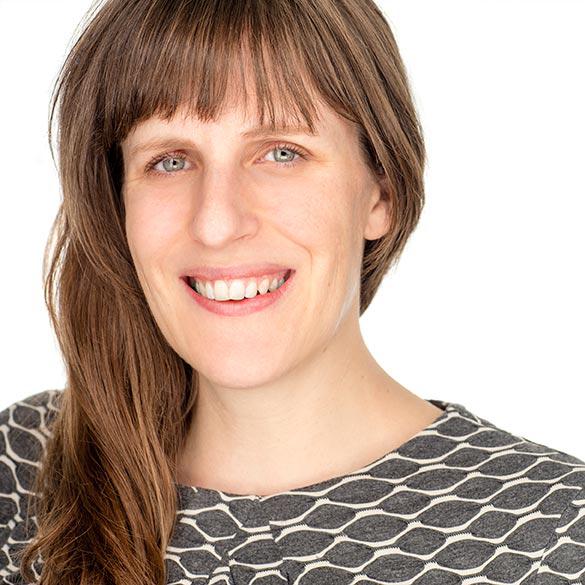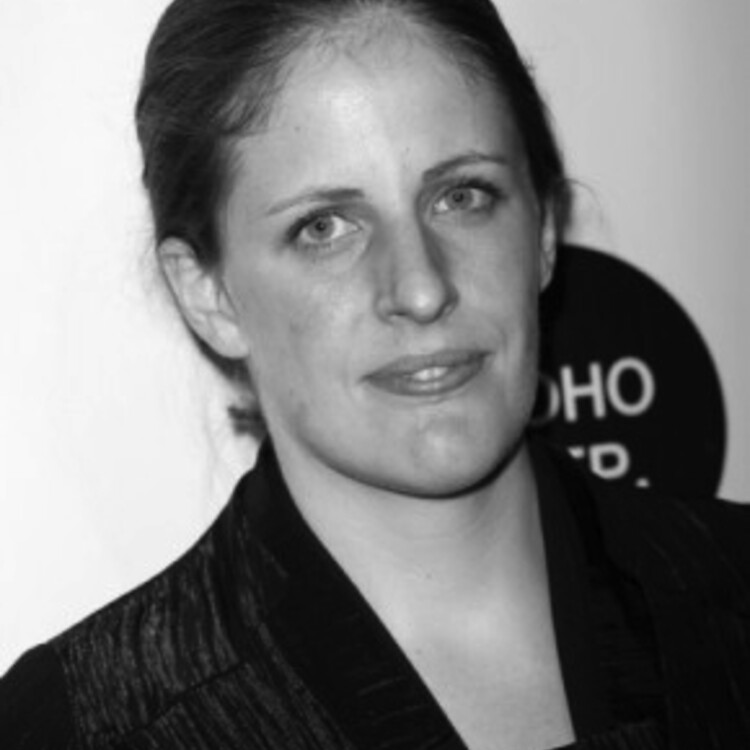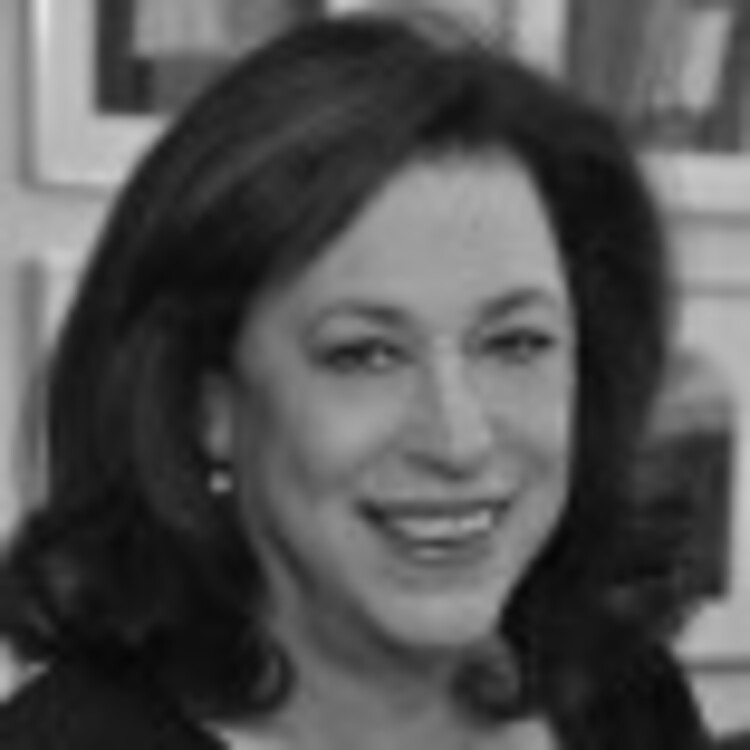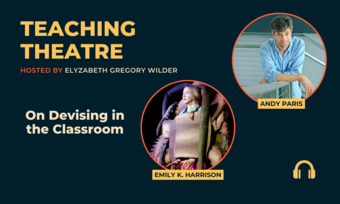Interview with Sarah Benson by Bess Rowen
At the end of a good play, many people give praise to the playwrights, actors, directors, and technicians who have contributed to the piece as a whole. Few audience members think about the people on the planning and business end of theatre, those who choose the seasons, raise the funds, and gather the artistic personnel. Of course, these sides of theatre are not mutually exclusive, as proven by the wonderfully hybrid career of Sarah Benson, artistic director of Soho Repertory Theatre (also known as Soho Rep). On a hot New York day in May, I headed down to Tribeca to speak with Sarah about what it means to be an artistic director.
Sarah Benson has been the artistic director of Soho Rep since 2007. Since moving from London to New York on a Fulbright award, she has directed and produced a great number of shows in the seventy-seat theatre, including David Adjimi's Elective Affinities with Zoe Caldwell and Sarah Kane's Blasted. During her time at Soho Rep, the theatre’s work has been recognized with seven OBIE awards, four Drama Desk nominations and The New York Times Outstanding Playwriting Award. Benson has an MFA from Brooklyn College and has also served as a mentor in the directing programs at NYU and Yale. She is editing the upcoming anthology The Methuen Drama Book of New American Plays, forthcoming this summer.
Bess Rowen: I know a bit about your background, but I’m wondering did you have any idea when you started in theatre that you were going to end up in a management position?
Sarah Benson: No, I don’t think I knew what this job was. I didn’t know this job existed. I started out trying to be an actor, because once you start to get interested in theatre—which I did as a teenager—you’re either in the school play or you’re not in the school play. That’s how you learn about theatre. So I tried being in the school play, and was really bad at being in the school play, and thought, “I love this whole world, but this is kind of torture.” I didn’t know anything about directing or producing. But eventually my drama teacher had the sense to say, “You know, there are other things that you can do in the theatre, apart from being on stage.” And that was when this whole world opened up.
Bess: For other people who don’t know this job exists, can you tell us a little bit about what your job is? How would you define your job as a director of plays and an artistic director of a theatre?
Sarah: Well, I’m a director and a producer. Soho Rep has always been run by working artists, and that’s a very important part of the identity of the company. That affects the values of the company and how the company is run, from an artistic standpoint, but also from a financial standpoint. Every management decision that is made, every budget decision, is a moral statement about what’s important and how you value people’s time. So, I think that the fact that Soho Rep has always been run by a working artist is an important part of the character of the company.
My day-to-day reality is radically volatile. When I’m in rehearsal, I’m not really in the office. And I direct at other theatres a fair amount too, so sometimes I’m in town, sometimes I’m out of town. We have a very flexible way of working together with the Soho Rep team, so that’s something that is an important part of the culture of the theatre, and something that our staff and board are very supportive of.
In a theatre of our size, we’re vacuuming on opening night; everyone’s involved in everything. But the heart of my job is really leading and inspiring the artists that we work with to make the boldest work that they can make. And working alongside Cynthia [Flowers, Soho Rep’s executive director], my partner here, to work with our whole team at the theatre, the staff, the board, to inspire people, to excite them about the work that we’re making. The same with our donors; that’s also a part of the job—to find partners who want to support the work we make. So, there isn’t a typical day, I guess.
I think it’s a two-way street. So, rather than young women feeling like, “Oh, I just want to work anywhere,” I would encourage young people out there, to really home in on where they want to see their work on stage.

Bess: It sounds like you really think of your duties at Soho Rep as very much an extension of your work as a director.
Sarah: I think that that’s absolutely right. I feel like that organic approach of how you work as an artist is very much how we produce work here as well. It’s very intuitive. It would be interesting to talk to other artists and hear their perspectives. We try to cultivate an environment where people feel very autonomous. So, we’re both hands-on and hands-off at the same time. We’re there to enable and empower people to make the best work that they can and to create what they need to do that—so we’re hands-on in that way. But we’re very hands-off in terms that we work with generative artists a lot, and so we approach all the work that we do—whether it’s playwright-driven or text-driven or director-driven or ensemble-led—all of it is approached from the point of view that it’s a holistic thing, with a kind of internal logic and coherence of its own. I think we try to spend a lot of time listening to what that is, whatever the project is, trying to figure out what does this piece need to be the strongest version of itself. And then we try to configure the company around making that happen. That’s the goal!
Bess: Switching gears a bit now, I’ve seen some other interviews where people have asked you about being a woman in the position of artistic director. I am interested to know if you think that anywhere along the line you’ve had a different kind of challenge that has come about from being a woman in this business?
Sarah: You know, I’d love to have a good answer for this question, but I’m really lucky in that I have the freedom to make the work I want to make. I feel like I’m standing on the shoulders of this whole generation of women who had to make huge sacrifices and that we are genuinely getting closer to true parity. Of course, there are still embedded issues in the culture that are bigger than the theatre, that are culture-wide gender issues. And some of that is still reflected in more commercial work. If you look across the spectrum of the percentage of women working on Broadway, the statistics are still shocking. So the problem is by no means solved, at all. I don’t mean to be blasé about it. It’s something that has become so integrated into our thinking and who we work with and how we work that I feel that gender disparity is not a challenge in the same way that it is I think for, say, female directors working in a Broadway arena or in commercial theatre where it’s much more of a male-dominated industry.
Bess: It sounds like the way that you all work, with this very collaborative system of mutual support, that it makes more sense that you are working with artists where you inspire them and they inspire you, which kind of proves to be a more streamlined process. You’re picking each other.
Sarah: Yes, exactly, that’s it! Self-selection.
Bess: I’m also wondering if you have any words of wisdom for young women who might be interested in a career like yours.
Sarah: I think it’s a two-way street. So, rather than young women feeling like, “Oh, I just want to work anywhere,” I would encourage young people out there, to really home in on where they want to see their work on stage. A lot of young people when they’re starting out just want to work anywhere that will take them, and I don’t think that’s good for anyone. I would encourage people to seek out the places where they’re really excited about the work, where they want to see their work on stage at these theatres, where they feel at home, and feel an organic fit. And then to just stalk those places, go see their work, go see everything that they do. Track those directors they’re interested in, track those producers that they’re interested in. Get to know them. And just be focused on where you want to be rather than “who will take me?”
Bess: That absolutely makes sense. Sounds like you’re speaking from personal experience?
Sarah: That’s definitely my personal take, and I know that the opposite approach has worked for many people—where they cast a wide net and amazing things happen from that approach too. But homing in has definitely been my approach. It’s the same as how I hate doing auditions. I like being able to say this is the actor I want to work with and I’m just going to ask this person to do this play. Similarly, I research like crazy and then I really stalk what I want to do and who I want to work with and get in a room with those people. You know, I interned here at Soho Rep, and I feel like it’s just been about being really focused on the people I want to work with. That’s kind of it. I definitely don’t think of it as a career.
Bess: That’s interesting. So it’s kind of decision-to-decision?
Sarah: Yeah, I think if I wanted to have a career, I’d do something that made logical sense. I think that a life in the theatre is a life-choice, and it’s a way of life, and it’s a passion, it’s a spiritual choice, it’s not a rational choice. Similarily, my path has been driven by that as well, by more of a holistic way of what feels right and who are the people I want to be in a room with.
Bess: Where do you see yourself in ten years?
Sarah: I remember people asking me that ten years ago, and if they’d told me that I’d be doing this, I would have been completely surprised. So, “I don’t know,” is the only answer. All I can say is that I love Soho Rep, and I love all of the projects that I’m working on, both long- and short-term, as a director. I think it’s just about continuing to have your work evolve so that you continue to feed it and it continues to feed you.
Bess: That’s great! Is there anything else you would like to tell the HowlRound/League of Professional Theatre Women audience?
Sarah: I feel like it’s a really great time to be making theatre, actually. There’s a very fertile cross-pollination happening between playwriting and generative work, and I think Soho Rep is situated in the middle of that in a way that I’m excited about. Typically these two worlds have been kept very separate: the producing world or the “new play” world, and then the presenting world. I’m just excited that those two worlds are starting to reach out to each more other. We’re certainly trying to do everything we can to generate that, to have those artists, producers, and presenters come together more. It’s a very exciting time to be making this work.













Comments
The article is just the start of the conversation—we want to know what you think about this subject, too! HowlRound is a space for knowledge-sharing, and we welcome spirited, thoughtful, and on-topic dialogue. Find our full comments policy here